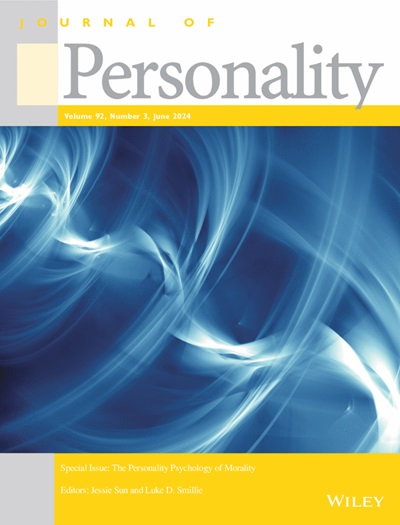Neuroticism, Internalizing Psychopathology, and Affective Reactions to Thought Content in Daily Life.
IF 2.7
1区 心理学
Q1 Psychology
引用次数: 0
Abstract
INTRODUCTION This study examined affective reactions to thought content (TC) in daily life and the influence of neuroticism and internalizing symptoms. METHODS Community young adults (N = 119; n = 80 with elevated depression/anxiety) completed assessments of neuroticism, internalizing symptoms, and daily diary measures of TC and positive/negative affect for seven consecutive days (N = 758 observations). Multilevel confirmatory factor analysis (MCFA) examined the structure of TC. Multilevel models examined TC-affect relationships and moderation by neuroticism and internalizing symptoms. RESULTS MCFA found two TC factors: internal-past (problems, emotions, the past) and external-present (external events, others, the present). Internal-past TC uniquely related to lower positive and higher negative affect within and between persons. External-present TC uniquely related to higher positive affect within and between persons. Neuroticism and internalizing related to higher negative and lower positive affect, but neither variable significantly moderated TC-affect relationships. Neuroticism had incremental effects over and above internalizing. At the facet level, self-consciousness uniquely predicted lower positive affect, and angry hostility uniquely predicted higher negative affect. DISCUSSION TC meaningfully relates to emotion in daily life. Neuroticism and internalizing predicted overall experience of positive/negative emotion, not affective reactions to specific TC. Within-persons, neuroticism and internalizing were differentiated by the incremental effect of neuroticism and the specific effects of neuroticism facets. Theoretical, methodological, and clinical implications are discussed.神经质、内化精神病理与日常生活中对思想内容的情感反应。
本研究探讨日常生活中对思想内容(TC)的情感反应,以及神经质和内化症状的影响。方法社区年轻人(N = 119; N = 80,抑郁/焦虑升高)完成了连续7天的神经质、内化症状、TC和积极/消极情绪的每日日记测量(N = 758)。多水平验证性因子分析(MCFA)检验了TC的结构。多层模型通过神经质和内化症状检验tc -影响关系和调节。结果smcfa发现了两个TC因素:内部过去(问题、情绪、过去)和外部现在(外部事件、他人、现在)。内部-过去情感障碍与个体内部和个体之间较低的积极情感和较高的消极情感相关。外现型情感障碍与人际间和内部的积极情感密切相关。神经质和内化与较高的消极情绪和较低的积极情绪相关,但两个变量都没有显著调节tc -影响关系。神经质的影响大于内化。在层面上,自我意识独特地预测较低的积极情绪,而愤怒的敌意独特地预测较高的消极情绪。讨论与日常生活中的情感有意义的关系。神经质和内化预测了积极/消极情绪的整体体验,而不是对特定TC的情感反应。人内、神经质和内化被区分为神经质的增量效应和神经质方面的特定效应。讨论了理论、方法和临床意义。
本文章由计算机程序翻译,如有差异,请以英文原文为准。
求助全文
约1分钟内获得全文
求助全文
来源期刊

Journal of Personality
PSYCHOLOGY, SOCIAL-
CiteScore
9.60
自引率
6.00%
发文量
100
期刊介绍:
Journal of Personality publishes scientific investigations in the field of personality. It focuses particularly on personality and behavior dynamics, personality development, and individual differences in the cognitive, affective, and interpersonal domains. The journal reflects and stimulates interest in the growth of new theoretical and methodological approaches in personality psychology.
 求助内容:
求助内容: 应助结果提醒方式:
应助结果提醒方式:


